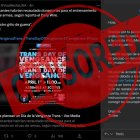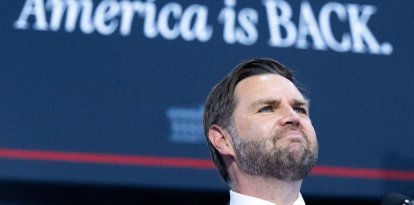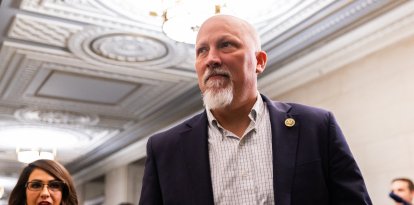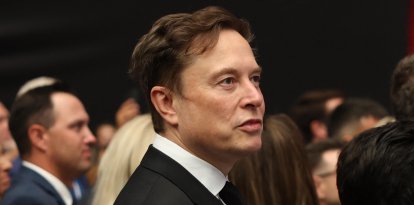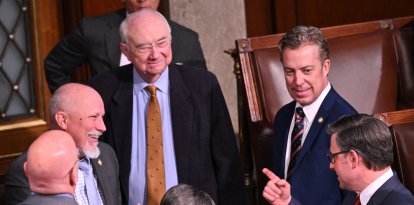Biden administration, Amazon, Google and Facebook allegedly colluded to silence Americans: 'It's an outrageous violation of our first amendment rights'
A House Judiciary Committee investigation shed light on the government's tactics of pressuring tech companies to silence dissenting voices during the pandemic. VOZ spoke with those affected.

Photo of Biden with a button that reads "censorship."
She had published her book 12 years ago. It had 4.8 stars and more than 500 comments. Why couldn't she find her book on Amazon? Eventually, Louise Kuo's surprise turned to disappointment. "Vaccine Epidemic" had been added, under government pressure, to an ad hoc list of titles "buried deep in the search results," as one member of Congress would later describe. No one told her, and there was no explanation.
Adam Ringham learned that his book "I'm In Your Vaccine" was listed in the "Do Not Promote" list four years later, when VOZ contacted him for this story. His reaction, however, was far from Kuo's surprise and disappointment: "Government censorship, completely not surprised lol."
Kuo and Ringham's books are two of more than 40, including one prefaced by Robert F. Kennedy Jr., listed in the latest installment of the Amazon Archives, an investigation by the House Judiciary Committee that revealed a series of emails between the tech company and the U.S. government.
The list included some children's books, some for parents and some more that were critical of Big Pharma. All, in one way or another, were linked to vaccination, explained Judiciary Committee Chairman Jim Jordan.
'The Amazon Files'
"Is the Administration asking us to remove books?" With that question to resolve, the Amazon team went into a private meeting with administration officials.
So it appears from a series of internal company emails unveiled by Jordan, who also explained that on that same day, March 9, 2021, the tech company created a new category called "Do Not Promote" (DNP).
As another internal email explains, "We did enable Do Not Promote for anti-vax books whos [sic.] primary purpose is to persuade readers vaccines are unsafe or ineffective..."
The back and forth between Democratic officials and employees, revealed by internal correspondence, exposes essential questions about censorship and business.
Amazon stated concerns about the possible media repercussions of removing or reducing the visibility of certain content. Both sides discussed the definition of the company's business. The government wondered why Amazon did less than Facebook, Twitter, etc., and Amazon asserts that, as a bookseller, it has the right to populate its virtual shelves at will, and asserts that one of its goals is to offer varied viewpoints even if some of its own customers believe they are "objectionable." They exchanged different readings of the company's content policy, and in a rehearsal of possible response, Amazon acknowledged, "Our guidelines do not specifically address content about vaccines."
This back-and-forth led to the early March meeting, the creation of the DNP list and a memo stating that 43 identification numbers, a series of unique digits that the company assigns to each book for sale, had been added. They corresponded, it would later be learned, to books by Kuo, Ringham and others.
"Amazon never removed my book from print, even under extreme government pressure," Ringham assessed. He applauded this, even, and claimed that, in its own way, the company defended freedom of speech: "As far as I know, [they] never deplatformed anyone or removed books from print." Although the temptation seems to have existed: in an email sent to two anonymous addresses ending in @amazon.com, the author clearly believed that, after the creation of the DNP, the next step should have been to "remove [books] from sales."
Not all blacklisted authors were so nice. Kuo argued that the company should explain itself. "Amazon has undue influence and market power," she says: "It deserves a lot more scrutiny and debate."
Tom Cowan, also on the DNP list, assures that he will continue to sell on Amazon, as well as any other ecommerce company that wants to offer his products. Ultimately, he believes, the one who gets hurt is the company itself: "If they want to decrease their business for whatever reason that is up to them and their problem."
The party who received unanimous repudiation was the government. "The right to choose is continually under attack, and this censorship is just another example," asserts Dr. Bob Sears, whose "The Vaccine Book" also appears in the DNP. However, he points out that the onslaught on the right to choose, specifically that of parents over their children, missed the mark:
"But I don't think our government was successful in this, as now more parents than ever before are questioning the CDC vaccine schedule and are considering raising their kids vaccine-free," he said.
Ringham adds pharmaceutical companies to the mix: "I fully understand government corruption and how much pharmaceutical companies have direct influence over politicians to protect their bottom line. Vaccines are a pharmaceutical wet dream, because they can't be sued no matter how poorly made and ineffective their product is and how much damage they cause."
"I think it is an outrageous violation of our First Amendment rights," adds Margo Baldwin, editor of two books on the list. "The government is not allowed to censor our speech." The founder of Chelsea Green Publishing, who closely followed the Republican committees' hearings on tech-government collusion, had a message for her colleagues:
"This is unconstitutional government behavior that has been going on since the beginning of the pandemic and it needs to end. Publishers should be condemning this," she said.
The 'censorship industrial complex'
In releasing the latest string of internal Amazon emails, Rep. Jim Jordan asserted that those were just "the tip of the iceberg." Amazon, YouTube and Facebook, he maintained, all bowed to "the Biden White House’s censorship campaign."
In early May, the Committee on the Judiciary and the Subcommittee on the Weaponization of the Federal Government released a report with internal documents from the various companies collected through subpoenas. This details a Democratic coercion campaign that, after months of pressure, resulted in changes to content moderation policies. In effect, this censored books, videos and posts.
"The Biden administration should have trusted the intelligence of the American people to make up their own minds."
In a June 2021 exchange, for example, a Meta employee sent CEO Mark Zuckerberg a timeline of Facebook's treatment of the "laboratory accident theory, which holds that COVID-19 was man-made. (As previously explained by VOZ, although authorities initially condemned this theory, today they acknowledge that it cannot be ruled out).
Tech companies went from reducing the visibility of post promoting this theory to directly eliminating them, due to "continued public pressure and tense discussions with the new (Biden) administration."
In that same email, the Amazon employee acknowledges the poor outcome of that content policy. Zuckerberg, in response, says it should serve as "a good reminder that when we compromise our standards due to pressure from an administration in either direction, we'll often regret it later."

Meta internal mailings
Internal Google memos about YouTube read that the company wanted to arrange a meeting with members of the administration to ask for feedback on a new content policy that was in the development stage. That was in September 2021, six months (and several emails and meetings) after the White House contacted Google to ask when it was going to act against COVID-linked disinformation.

Google internal emails.
Collusion damages
The members of Congress who authored the report asserted that the government initiative infringed on the First Amendment. In addition, they stated that it ended up silencing truthful information and other non-verifiable information, such as satire, memes, opinions and personal experiences, and leading to, at times, Americans themselves exercising prior censorship.
They also asserted that it had an impact on the response to the pandemic: "Because public health measures could not be fairly debated by the public and assessed on their merits, the Biden Administration and other policymakers imposed public health measures that were devasting [sic.] to schoolchildren, workers, and other Americans around the country."
"America needs to have free and open debate on the pressing issues of the day," added the lawmakers, who also pledged to push for legislation to prevent such behavior. "The Biden Administration should have trusted the intelligence of the American people to make up their own minds."
Freedom of speech or the right to information?
"The situation is desperate," says philosopher Gabriel Zanotti. The Argentine professor and author describes an apathetic society in the face of state encroachment on individual freedoms. "The Amazon Files" and the 40 blacklisted authors are just examples of a trend that is difficult to reverse: even if the party in the White House changes, the damage, he assures, is cultural.
"The excuse is the supposed right to information, that is what has undermined in the West the awareness of freedom of expression," he maintains.
He continued: "Freedom of speech implies that in a free society people discuss what the facts are. The government does not have to say this is the fact, this is not the fact; that is discussed freely."
Ceding the role of guarantors of true information to the government, he assures, gives them a "totalitarian weapon." From his blog, Filosofía para Mí (Philosophy for Me), he has been condemning advances by the state for years. He claims that Google deleted two of his blog posts and that, with what he writes, "it's a miracle that it hasn't deleted all of them."
But that's not all: "If you are epistemologically trained, you know perfectly well that there are no pure facts, but interpretations." His position is not a denial of truth: interpretations may or may not be true. It is, rather, a cry for putting messages -- spoken, posted, written, etc. -- in context.
It's not so much whether the origin of COVID was a pipette in a lab, which it may or may not be, but to consider when it's said, who's saying it, why they're saying it (what's known as "horizon"). And, also, if it can be defended.
Rolling back liberties
How is the First Amendment left? "Very weakened," Zanotti laments. As an example, he cites the recent Supreme Court ruling in favor of the administration in a complaint over its collusion with tech companies:
He continued: "Amy Coney Barrett, like everyone else, has the information scheme in her head, so, of course, she couldn't bring herself to take away the federal government's weapon of 'protecting' citizens from false information."
Cultural freedom, religious freedom. The problem goes beyond free speech: "The awareness of individual freedoms in the West is weakened and that is why not only the left advances, but also the woke, the lobbies, advance against freedom of speech." If you are in favor of gender reassignment surgeries, he says, "fine, ... write it in an article," but "don't try to get the state to put [those who think differently] in jail."
"The solution to this is long-term, cultural," he assures. "It would be to return to a consensus around the Judeo-Christian ideals that existed at the time of the founding of the United States." Is it possible? It will be difficult, he says, as most people don't do anything until it directly affects them. Few, few, dare to stand up to the state. Most people don't even realize it. "It's a dystopian world."








